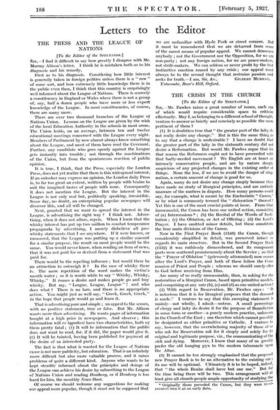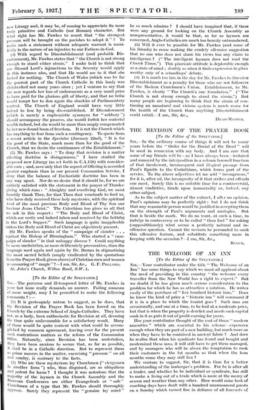THE CRISIS IN THE CHURCH [To the Editor of the
SPECTATOR.]
Sm,—Mr. Fawkes raises a great number of issues, each one of which would require considerable space to criticize effectually. May!, as belonging to a different school of thought, venture to answer as briefly and concisely as possible the more pertinent of them ?
(1) It is doubtless true that" the greater part of the laity do not really desire any change." But is this the same thing as to say that a change is undesirable ? I have no doubt that the greater part of the laity in the sixteenth century did not desire a Reformation. But would Mr. Fawkes argue that for that reason the Reformers ought not to have proceeded with that badly-needed movement ? We English are at heart an intensely conservative people, and are by nature deeply suspicious of any projected changes in the existing order ol things. None the less, if we are to avoid the danger of stag. nation, a certain amount of change is good for us.
Again, many do not desire any change simply because they have made no study of liturgical principles, and are entirely unaware of the matters in dispute. How many persons could say, for example, what is meant by the Eucharistic "Canon," or by what is commonly termed the " dislocation " thereof? Yet this is one of the most crucial points at issue. From time immemorial, the Canon has been one united action, consisting of (a) Intercessions * ; (b) the Recital of the Words of Insti- tution; (c) the Oblation, or Act of Offering ; (d) the Lord's Prayer. I have omitted minor details, but these constitute the four main divisions of the Canon.
Now in the First Prayer Book (1549) the Canon, though considerably simplified in detail, was preserved intact as regards its main structure. But in the Second Prayer. Book (1552) it was ruthlessly dismembered, and its component parts were scattered promiscuously about the Service ; so that the "Prayer of Oblation" (grievously attenuated) now comes after the Lord's Prayer, and both of these follow the Com- munion of Priest and People ; whereas we should surely offer to God before receiving from Him.
Are many of us really unreasonable, then, in asking for the restoration of a liturgical Canon, based upon primitive models, and comprising at any rate (b), (c) and (d) as one united action?
(2) With regard to Reservation, Mr. Fawkes says : It is notorious that it is for liturgical purposes that the demand is made." I venture to say that this sweeping statement is mainly—not wholly, I admit—untrue. A small percentage of clergy and laity do desire it for the purpose of Benediction in some form or another—a purely modern practice, unknown in the Church of the East ; one therefore which cannot possibly be designated as either primitive or Catholic. I venture to say, however, that the overwhelming majority of those of us who ask for Reservation ask for it simply and solely for its original and legitimate purpose, viz., the communicating of the sick and dying. Moreover, I know that many of us greatly prefer the old hanging pyx to the modern tabernacle upon the Altar.
(3) It cannot be too strongly emphasized that the proposed new Prayer Book is to be an alternative to the existing one ;
its use will be optional. Ultimately it is to be hoped, indeed, that "the whole Realm shall have but one use." But for the time being there will be two. This arrangement will at least give all church-people ample opportunity of studying the
* Originally these preceded the Canon, but they were incor• aerated into it at an early date. new Liturgy and it maybe, of coming to appreciate its more truly primitive and Catholic (not Roman) character.. But what right has Mr. Fawkes to assert that "the strongest pressure will be brought on the parishes to adopt it " ? To make such a statement without adequate warrant is mani- festly in the nature of an injustice to our Fathers-in-God. (4) With 'regard to Disestablislunent (and probable ilis-
endowment), Mr. Fawkes states that "the Church is not strong enough to stand either strain." I make bold to think that our Blessed Lord's injunctions to the Seventy would apply in this instance also, and that He would see to it that she lacked for nothing. The Church- of Wales (which was by far the poorest part of the Church Catholic in this land) was disinherited not many years since ; yet I venture to say that she now regards her loss of endowments as a very small price to have paid for the glorious gift of liberty, and that no bribe would tempt her to don again the shackles of Parliamentary control. The . Church of England would have very little indeed to lose by being dis-established. If Discndowment (which is merely, a euphemistic synonym for "robbery ") should accompany the process, she would forfeit her material wealth indeed, but she would be more than amply compensated by her new-found boon of freedom. It is not the Church which has anything to fear from such a contingency. To quote front a recent article in the Spectator (January 22nd), "It is for the good of the State, much more than for the good of the Church, that we desire the continuance of the Establishment."
(5) Mr. Fawkes says : "To deny that revision is a matter affecting doctrine is disingenuous." I have studied the proposed new Liturgy (as set forth in C.A.158) with consider- able care ; and, save only that the aspect of Offering is accorded greater emphasis than in our present Communion Service, I deny that the balance of Eucharistic doctrine has been in any way upset. Nor do we desire that it should be, for we are entirely satisfied with the statement in the prayer of Thanks- giving which runs : "Almighty and everliving God, we most heartily thank Thee, for that Thou dost vouchsafe to feed us, who have duly received these holy mysteries, with the spiritual food of the most precious Body and Blood of Thy Son our Saviour Jesus Christ." The Catechism too gives us all that we ask in this respect : "The Body and Blood of Christ, which are verily and indeed taken and received by the faithful in the Lord's Supper."' Such language is quite inapplicable unless the Body and Blood of Christ are objectively present.
(6) Mr. Fawkes speaks of the "campaign of slander . . . against the Bishop of Birmingham." Who started a "cam- paign of slander" in that unhappy diocese ? Could anything he more unchristian, or more deliberately provocative, than the language used again and again by Dr. Barnes in stigmatizing the most sacred beliefs (amply vindicated by the quotations from the Prayer Book given above) of Christian men and women us savouring of" magic" ?—I am, Sir, &c., G. F. POLLARD.
St. John's Church, Wilton Road, S.W.1.



























































 Previous page
Previous page